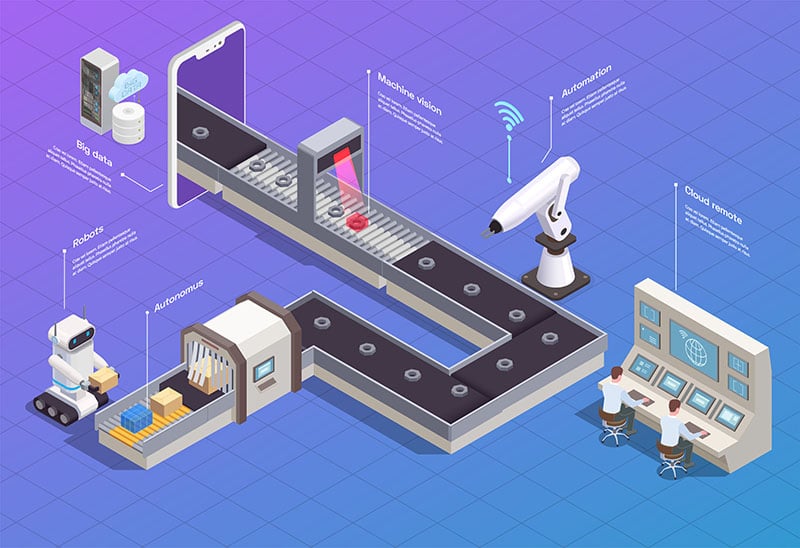Artificial intelligence has quietly been taking over the manufacturing industry, and it’s having a major impact.
Take a look at the key benefits of AI in manufacturing, and see 7 useful case studies that highlight how it’s revolutionizing production.
Let’s take a deep look at artificial intelligence in the manufacturing industry.
What are the Benefits of AI in Manufacturing?
But what are some of the
key benefits of AI?
Implementing AI can be a challenge for manufacturers, but when done properly, it can seriously improve productivity to maximize output and bring costs down.
- More efficient design process
- Increased engineer productivity
- Enhanced customer experience
- Improved inventory management
- Better quality control
- Accurate maintenance forecasting
- Streamlined factory layouts
- And more
Let’s look at AI in manufacturing companies and see how it’s being used to maximize these benefits.
7 Ways Artificial Intelligence in Manufacturing is Changing the Game

It might have started with a trickle, but the use of AI applications is expanding throughout the manufacturing industry.
Here are some of the ways artificial intelligence in the manufacturing industry is making an impact.
1. Predictive Quality
Predictive quality analyzes incoming data to solve quality problems in advance.
This is hugely valuable to any manufacturer because it identifies root causes that lead to serious quality defects. If those defects were to go undetected, it could lead to poor-quality products and even mass recalls.
You need to ensure that what comes off the production line is going to positively represent your brand. Predictive quality can make sure this happens. With real-time alerts and notifications, this vital part of AI in manufacturing can warn operators as soon as any inefficiencies occur in the manufacturing process.
2. Increasing Yield
By improving production quality, you can significantly increase yield by cutting down on reworks and defective parts.
Manufacturers face strict timelines thanks to
just-in-time supply chains, and an improvement in yield can make all the difference. As companies continue to adopt AI, more and more efficiencies are found that can continue to boost yield while maintaining quality assurance.
3. Scrap Reduction
The more scrap you produce, the more it’s going to cut into your margins.
Artificial intelligence in manufacturing plays an important role in predicting behavior across product specifications, allowing manufacturers to get more out of their raw materials.
When your assembly line is churning out tens of thousands of products, saving a little scrap on each unit can make a massive difference.
4. Predictive Maintenance
If an important piece of machinery is out of action it’s going to put your manufacturing behind schedule.
Luckily, there are AI solutions for this as well.
By analyzing historic maintenance logs, AI can predict maintenance needs based on expected workloads. This takes a lot of the guessing out of maintenance and ensures equipment is functioning properly for longer.
Less downtime means greater output, and lower costs.
5. Demand and Inventory Forecasting
Another important AI use case is demand and inventory forecasting.
Demand forecasting can be a nightmare for businesses, especially if they work with seasonal or other niche products. AI helps to solve some of these problems by analyzing the data to forecast demand for critical parts.
With AI powering your demand forecasting, you can plan ahead to make sure you’re producing the right quantities no matter what happens.
6. Workplace Safety
Aside from the human cost, workplace accidents can also have a big impact on manufacturing efficiency.
Manufacturers can’t afford to leave themselves open to lawsuits and they have to pay the utmost attention to workplace safety. AI in manufacturing is playing a big part in this. Not only can AI help identify potential risks, but it can also speed up the analysis process post-accident to make sure the right precautions are put in place.
7. Cybersecurity
Manufacturing plants can be a target for cyberattacks that cripple production and lead to huge costs. If manufacturers aren’t actively protecting against this, then it could lead to huge problems.
This is another area where AI is having an impact on the manufacturing industry.
Cybersecurity is always evolving and AI is helping to keep top manufacturers ahead of the game. With the power to autonomously detect malware, fraud, and unusual employee activity, it can be a huge help in protecting against things like
corporate espionage.
You’ve Got the Data, Now You Need AI to Unlock It
The data is all there, but it’s not useful unless you can use it to create actionable insights.
Manufacturers are leaving valuable efficiency gains on the table because they’re not able to leverage AI in the right way. To start leveraging artificial intelligence in manufacturing, you’ve got to work with an experienced data analytics provider, and if you want to work with the very best, then that’s Mactores.
We will help you turn data into insights that power your business, allowing you to become more automated, agile, and secure. With our wide range of analytics solutions, we can spot inefficiencies, reduce waste, and make your manufacturing processes more profitable.
It’s exactly what your manufacturing business needs and it’s just a click away!



